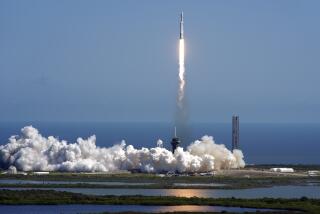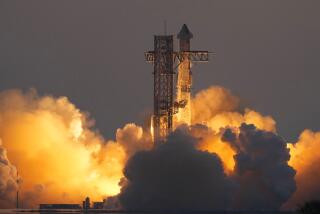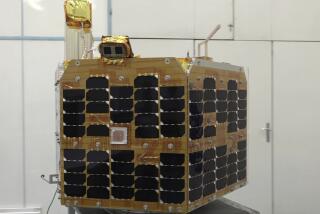Europe Satellite-Orbiter Falters and Is Destroyed
KOUROU, French Guiana — Europe’s Ariane rocket was blown up by mission control nine minutes after blastoff Friday night when its third stage failed to fire, sending the rocket and a $55-million satellite payload tumbling into the Atlantic.
“The whole mission has been lost,” said Frederic d’Allest, chairman of Arianespace, the French-led international consortium that markets, builds and launches the Ariane, the top competitor to the U.S. space shuttle.
D’Allest said the first two stages of the 148-foot, unmanned rocket separated correctly and on time, but the engine in the third stage failed to ignite, forcing officials to order the detonation 9 minutes and 8 seconds into the flight.
The rocket was 50 miles high at the time, and the third stage and the 4,400-pound Intelsat 5 international satellite fell together into the Atlantic.
A space agency spokesman said the decision to blow up the rocket was made not because it threatened populated areas but because it was disappearing over the horizon beyond reach of the radio detonation signal.
The 18th launching of the Ariane had been delayed 53 minutes when a red warning light flashed in the control center. Officials said that problem appeared to be with the communications link between ground stations and the satellite aboard the rocket.
Intelsat, short for International Communications Satellite Organization, uses satellites to link 110 countries with telephone, television and other communications services. The company is responsible for virtually all international television service and handles two-thirds of the world’s telephone traffic.
The satellite was to be operational by August. It was to orbit 22,370 miles above the Earth.
Two Ariane rockets have been launched successfully this year, sending four satellites into orbit. Last fall however, an Ariane rocket had to be detonated when it flew out of control.
An eerie silence fell over mission control when news of the rocket’s failure was revealed.
Even before the Jan. 28 Challenger space shuttle disaster, Arianespace secured 50% of the global satellite delivery business. After the shuttle disaster, Ariane said it would make room for eight more satellite deliveries by the end of 1988 for customers unable to use the shuttle program.
Earlier in the day, D’Allest told reporters that all eight openings had been filled, meaning more than $350 million in new business for Arianespace.
More to Read
Sign up for Essential California
The most important California stories and recommendations in your inbox every morning.
You may occasionally receive promotional content from the Los Angeles Times.










